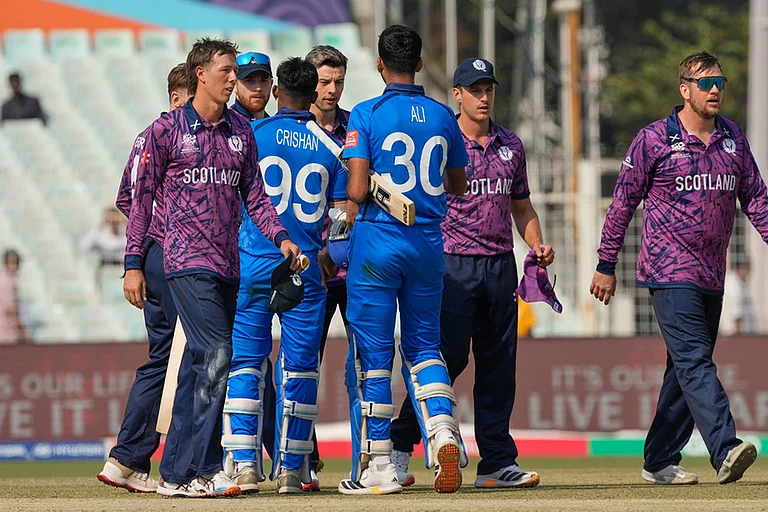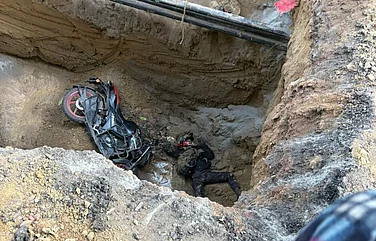The Indian Left is making forays into uncharted territory. The journey to Hyderabad undertaken by CPI(M) General Secretary H.S. Surjeet and politburo member Sitaram Yechury on October 27 is final proof of that. The main thrust of their mission is to try and broker a rapprochement between N.T. Rama Rao and Chief Minister Chandrababu Naidu. All this is, ostensibly, on behalf of their allies in the National Front, but also for reasons of their own.
The CPI(M) as middleman? That’s a change from being a passive onlooker in quarrelsome electoral partnerships. Yes, the party is indeed emerging as the main liaison agency for regional groupings which are seen as essential components of a perpetually fragile "secular, democratic third front".
And the motivation for this dip in the cauldron of "bourgeois politics" seems manifold. With the National Front in disarray and its mainstay and only definite component, the Janata Dal, seemingly incapable of resolving even its own internal contradictions, time is running out for the third front to pull up its socks and present itself as a viable electoral option. "Hence the proactive role adopted by us," says a senior party leader.
A politburo member offers another, rather sanguine, rationale: "The party has realised that keeping these channels of communication open will serve our long-term aims. After all, the social base of all these regional formations are the masses, whom we want to win over to the Left."
But, perhaps, the stronger motivation is the possibility of short-term gains. In all the states where the CPI(M) has been speaking to regional parties (apart from Uttar Pradesh), the Janata Dal has a negligible presence, the Congress is the main opposition and the Left has pockets of influence which it wants to use as launching pads for future gains. Assam, Tamil Nadu, Andhra Pradesh and Punjab fall in this category.
The party’s assessment that firm alliances are likely to emerge in the post-election scenario rather than earlier is another reason that has propelled it to ensure that it remains in touch with various regional groupings. According to party sources, "in such a scenario, the Janata Dal has no great motivation to take up the cudgels on behalf of the National Front. So it is left to us to try and ensure that these regional formations stay with the third front to prevent either a Congress or a BJP government at the Centre. And to ensure that we are not smothered in these states."
This policy has given a different hue to the CPI(M) in various states. In Assam, the party is trying to ensure that the Asom Gana Parishad tones down its anti-minority rhetoric and remains a potential partner in the third front instead of allying with the BJP. In Andhra, the CPI(M) is trying very hard to bring the feuding Telugu Desam family together, even while formally voicing its support for the Chandrababu Naidu faction.
Tamil Nadu—where the Janata Dal, CPI and CPI(M) have voiced their preferences for the AIADMK, DMK and MDMK respectively—has seen the CPI(M) concede that even if Chief Minister J. Jayalalitha’s party joins the National Front, it won’t make a difference to the NF-LF combine at the cen-AJIT NINAN tre. In Punjab, the CPI(M) is keeping its fingers crossed that the Akali Dal (Badal) comes through on dissociating itself from the separatists, after the World Sikh Conference fiasco. And in Uttar Pradesh, it has been firm on the need to ensure that Mulayam Singh Yadav aligns with the NF-LF.
Yet, for all this splashing around in murky waters, the irony is that the CPI(M) cannot afford to be seen indulging in realpolitik on this scale. And the concurrent need to assert its special identity has led to the rather piquant situation it finds itself in vis-a-vis its stand on the minimum common programme for the NF-LF combine—a question that has been hanging fire for a long time.
"Our position is that the National Front should first decide on its constituents and thrash out its own manifesto. The Left Front already has a common pro-gramme. Then we can discuss the formulation of a minimum programme for the combine based on these two documents," says Sitaram Yechury.
The CPI(M) is taking the forthcoming general elections very seriously indeed; this comes across clearly because it has plunged into regional match-making despite opposition from a small but significant section of the party. And when top Left Front leaders decided on October 23 that there would be "no contest between candidates of different Left parties" anywhere in the country during the elections, it only reinforced the feeling that the CPI(M) is pulling out all stops.


























